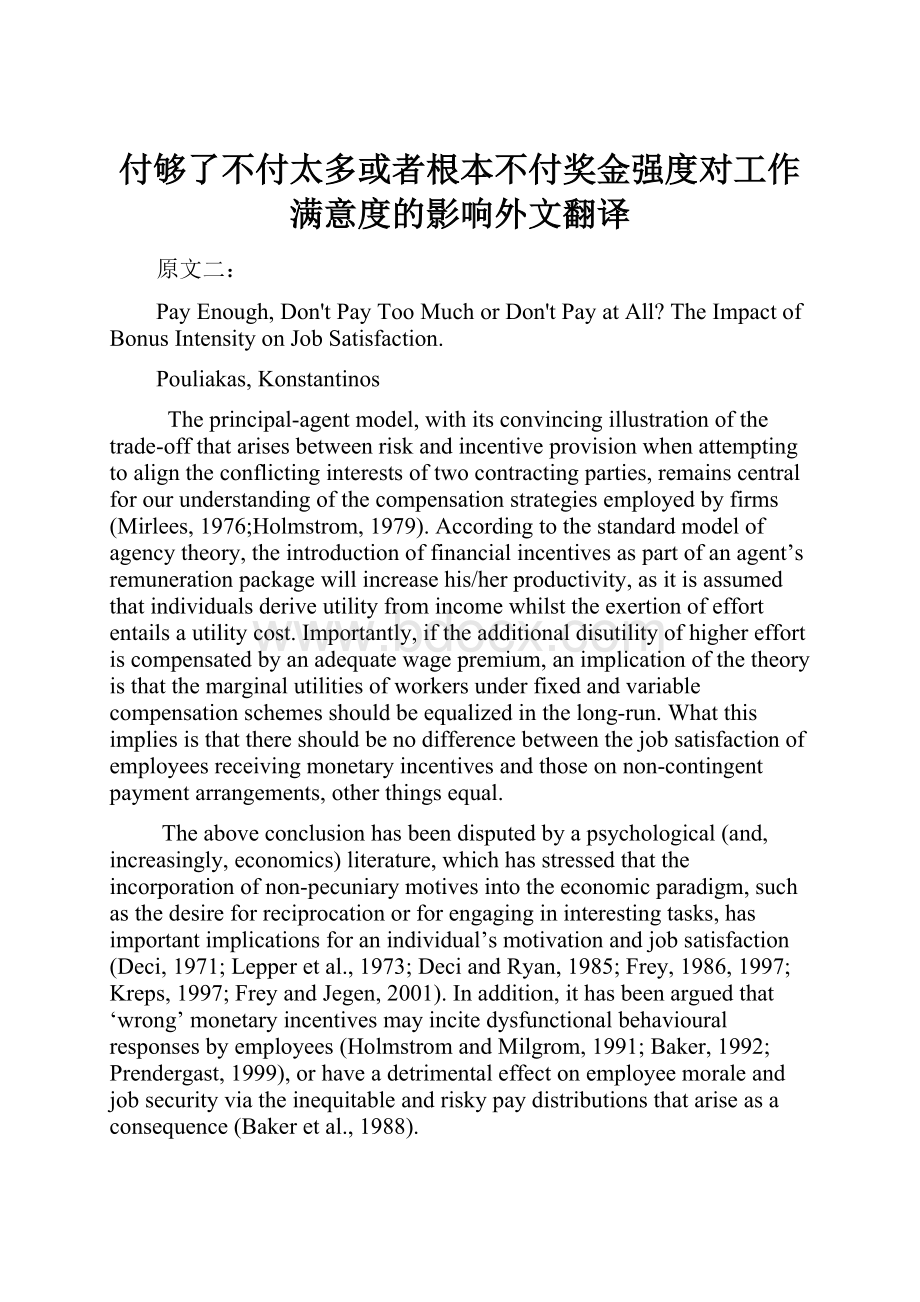付够了不付太多或者根本不付奖金强度对工作满意度的影响外文翻译.docx
《付够了不付太多或者根本不付奖金强度对工作满意度的影响外文翻译.docx》由会员分享,可在线阅读,更多相关《付够了不付太多或者根本不付奖金强度对工作满意度的影响外文翻译.docx(10页珍藏版)》请在冰豆网上搜索。

付够了不付太多或者根本不付奖金强度对工作满意度的影响外文翻译
原文二:
PayEnough,Don'tPayTooMuchorDon'tPayatAll?
TheImpactofBonusIntensityonJobSatisfaction.
Pouliakas,Konstantinos
Theprincipal-agentmodel,withitsconvincingillustrationofthetrade-offthatarisesbetweenriskandincentiveprovisionwhenattemptingtoaligntheconflictinginterestsoftwocontractingparties,remainscentralforourunderstandingofthecompensationstrategiesemployedbyfirms(Mirlees,1976;Holmstrom,1979).Accordingtothestandardmodelofagencytheory,theintroductionoffinancialincentivesaspartofanagent’sremunerationpackagewillincreasehis/herproductivity,asitisassumedthatindividualsderiveutilityfromincomewhilsttheexertionofeffortentailsautilitycost.Importantly,iftheadditionaldisutilityofhighereffortiscompensatedbyanadequatewagepremium,animplicationofthetheoryisthatthemarginalutilitiesofworkersunderfixedandvariablecompensationschemesshouldbeequalizedinthelong-run.Whatthisimpliesisthatthereshouldbenodifferencebetweenthejobsatisfactionofemployeesreceivingmonetaryincentivesandthoseonnon-contingentpaymentarrangements,otherthingsequal.
Theaboveconclusionhasbeendisputedbyapsychological(and,increasingly,economics)literature,whichhasstressedthattheincorporationofnon-pecuniarymotivesintotheeconomicparadigm,suchasthedesireforreciprocationorforengagingininterestingtasks,hasimportantimplicationsforanindividual’smotivationandjobsatisfaction(Deci,1971;Lepperetal.,1973;DeciandRyan,1985;Frey,1986,1997;Kreps,1997;FreyandJegen,2001).Inaddition,ithasbeenarguedthat‘wrong’monetaryincentivesmayincitedysfunctionalbehaviouralresponsesbyemployees(HolmstromandMilgrom,1991;Baker,1992;Prendergast,1999),orhaveadetrimentaleffectonemployeemoraleandjobsecurityviatheinequitableandriskypaydistributionsthatariseasaconsequence(Bakeretal.,1988).
Oncethesemechanismsaretakenintoconsideration,itbecomesclearthatthetheoreticalimpactofmonetaryincentivesonworkereffortandjobsatisfactioncanbeambiguous.Ascorroboratedinanumberofeconomicexperiments(FalkandKosfeld,2006;ErikssonandVilleval,2008),theincentiveeffectsofmonetaryrewardsarelikelytobecompromisedinaworldofimperfectlabourmobilitypopulatedbyheterogeneousagentswithvaryingpsychologicaldispositions.Totheextentthatincentiveschemesallowforoptimizationofeffort,facilitateworkerautonomyandenhanceself-determinationtheyshouldincreasejobsatisfaction,otherthingsequal.Yetincreasingearningsrisk,crowdingoutoftheinherentpleasantnessinperformingone’sjobandlowermoralecanleadtodisgruntledemployees.
Workontheproductivityoftheknowledgeworkershasbarelybegun.Inthetermsofactualworkonknowledgeworkerproductivityweare.In2000,roughlywherewewereintheyear1900,acenturyago,intermsoftheproductivityofmanualworker.Butwealreadyknowinfinitelymoreabouttheproductivityoftheknowledgeworkersthanwedidthenaboutthatofthemanualworker.Weevenknowagoodmanyoftheanswers.Butwealsoknowthechallengestowhichwedonotyetknowtheanswers,andonwhichweneedtogotowork..
Managementˊsdutyistopreservetheassetsoftheinstitutioninitscare.Whatdoesthismeanwhentheknowledgeoftheindividualknowledgeworkerbecomesanassetand,inmoreandmorecases,themainassetsofaninstitution.Whatisneededtoattractandtoholdthehighest-producingknowledgeworkers?
Whatisneededtoincreasetheirproductivityandtoconverttheirincreasedproductivityintoperformancecapacityfortheorganization?
Howtoimproveproductivity?
Makingknowledgeworkersproductiverequireschangesinbasicattitude-whereasmakingthemanualworkermoreproductivityonlyrequiredtellingtheworkerhowtodothejob.Andmakingknowledgeworkersproductivityrequirechangesinattitude,notonlyonthepartoftheindividualknowledgeworkerbutonthepartofthewholeorganization.Itthereforehastobe"pilot"–asanymajorchangeshouldbe.
Thegrowingeconomicsliteratureonsubjectivewell-being(FreyandStutzer,2002;BlanchflowerandOswald,2004;VanPraagandFerrer-i-Carbonell,2004;EPICURUS,2007;Frey,2008)hasemphasizedthatmeasuresofjobsatisfactionaresignificantpredictorsofemployeebehaviour[e.g.quits(Freeman,1978),absenteeism(Clegg,1983)orworkerproductivity(Judgeetal.,2001)].Itfollowsthatunderstandingtheinfluenceofmonetaryincentivesonjobsatisfactionisimportantgiventhatthecompositionofanemployee’sremunerationpackageisanintegralelementofhis/heroverallworkingconditions.
OtheraspectsofPRPmay,nonetheless,diminishproductivityandworkersatisfaction.Ithasbeenillustratedthatwronglydevisedcompensationschemescanhavecounterproductiveconsequences,astheymayencourageworkersto‘game’thecompensationsystemtotheiradvantagebymultitasking(Baker,1992)orbyengaginginrent-seekingbehaviouraimedatinfluencingthesubjectiveevaluationsoflinemanagers(Prendergast,1999).Holmstrom’s(1982)seminalpaperhasalsoshowedthatutilizingteamproductionincentiveschemes(suchasprofit-sharing)maydiluteindividualperformanceasaresultoffree-riding.Inthefaceofevidencesuggestingthatthejobsatisfactionofemployeesisintrinsicallylinkedtotheirrelativepaystatus(ClarkandOswald,1996;Clark,1999;Ferrer-i-Carbonell,2005;Clarketal.,2008[a]),thedemoralizingdispersionandvariabilityinwagesthatensuesfromPRPschemesisalsolikelytoaffectattitudestoworkinanegativefashion.Furthermore,ithasoftenbeenclaimedthatfinancialincentivesunderminecollaborationandteamwork,emphasizethepowerasymmetrybetweenmanagementandtheworkforce,andreduceemployeerisk-takingandinnovation(Kohn,1993).
Animportantcommonelementoftheaboveexperimentsisthat‘‘small’’incentivesarelikelytoexertanegativeeffectonbehaviour(withdiscontinuityclosetozero),whileforhighpoweredrewards(orpunishments)thestandardpriceeffectisexpectedtoprevail.4Thispredictionhasbeencorroboratedintheproposer-respondentgameexperimentofGneezy(2004),whichultimatelygivesrisetoa(V)W-shapedrelationshipbetweeneffortandtheintensityof(positive)incentives.Incontrast,theIQandcountingtasksexperimentsperformedbyPokorny(2008)onundergraduateGermanstudentsindicateaninverseU-shapedrelationshipbetweeneffortlevelsandthestrengthofmonetarypayoffs.Theauthorattributeshercontradictingfindingstotheexistenceofreferencedependentpreferencesamongsubjects,whichimplydecreasingeffortchoiceswithstrongerincentivesonceareferenceincomelevelisexceeded.Anotherexampleofthenon-monotonicmotivationeffectofincentivescanbefoundinthefieldstudyofMarsdenetal.(2001),whohighlightthatalthoughalargenumberofworkersintheirsampleexperiencedadeteriorationofworkplacerelationsandcooperationfollowingtheintroductionofincentivepay,PRPmotivatedthosewhoreceivedaboveaveragepayments.
Then,thereisaneedtoworkconsistently,patiently,andforaconsiderablelengthofuninterruptedtime,inthissmallareaorwhitthissmallgroup.Forthefirstattemrts,evenifgreetedwhitgreatenthusiasm,willalmostcertainlyrunintoallkindsofunexpectedproblems.Itisonlyaftertheproductivityofthissmallgroupknowledgeworkershasbeensubstantiallyincreasedthatthenewwaysofdoingtheworkcanbeextendedtoalargerareaifnottotheentireorganization.Andbythnwewillalsohavelearnedwherethemainproblemsare.Wetrytojumpthepilotstage-andthereisalwayspressyretodoso-onlymeansdiscreditingtheentireenterprise.Butifproperlypilothed,wecanalreadydoagreatdealtoimproveanddrasticallyknowledgeworkerproductivity.Knowledgeworkerproductivityisthebiggestof21st-centurymanagementchallenges.Inthedevelopedcountriesitistheirfirstsurvivalrequirement.Innootherwaycanbethedevelopedcountrieshopetomaintainthemselves,letalonetomaintaintheirleadershipandtheirstandardsofliving.
Thestudyusesdatafromwaves8to17(1998–2007)oftheBritishHouseholdPanelSurvey(BHPS),asreadilyavailableinformationonindividual-basedPRPisonlyavailableforthoseyears,whilethesurveyquestionclarifyingtheamountofbonuspaywasaskedfrom1997onwards.TheBHPSisanationallyrepresentativesurveythateachyearinterviewsarandomsampleofnearly10,000individualsinapproximately5,500Britishhouseholds.Ithasbeenconductedannuallysincelate1991andcontainsawealthofinformationonemployees’personalandemploymentcharacteristics.Thesampleusedinthepaperisrestrictedtoindividualsbetween18and65yearsofagewhoarepaidemployeesatthesurveydate.For10wavesoftheBHPSthisyieldsanunbalancedpanelof67,535observationson14,479uniqueindividuals.
Followingtheratingofvariouspartialjobsatisfactions(e.g.promotionprospects,totalpay,relationswithsupervisors,jobsecurity,abilitytoworkonowninitiative,theactualworkitselfandhoursofwork),individualsintheBHPSareaskedaquestionregardingtheiroveralljobsatisfaction,wordedasfollows:
‘‘Allthingsconsidered,howsatisfiedordissatisfiedareyouwithyourpresentjoboverallusingthesame1–7scale?
’’.7Answersareevaluatedonasevenpointscale,whereavalueofonecorrespondsto‘notsatisfiedatall’andsevenreflects‘completesatisfaction’.Thesejobsatisfactionresponsesareemployedinthisstudytoidentifythedeterminantsoftheutilityofem